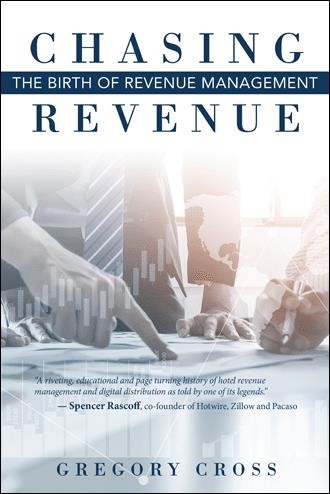Gregory Cross introduced revenue management to Hilton and helped evolve it at Hyatt. In a new book, he shares his story.
By Christopher Durso, Vice President of Content Development, Hospitality Sales & Marketing Association International (HSMAI)
Inspired by the high-level, cross-disciplinary conversation of HSMAI’s Curate event, the Curate Book Club interviews the authors of new and recent books that are relevant to hospitality sales, marketing, and revenue optimization leaders. Read previous Curate Book Club interviews here.
 Gregory Cross has been part of revenue management since the beginning. Back when the airlines were still calling it yield management, Cross was among the generation of hotel professionals who figured out how to apply this new field to hospitality — starting in 1980 at Hilton, where he spent 29 years, leaving as senior vice president of revenue management, and continuing at Hyatt, where he served in the same role before retiring in 2018.
Gregory Cross has been part of revenue management since the beginning. Back when the airlines were still calling it yield management, Cross was among the generation of hotel professionals who figured out how to apply this new field to hospitality — starting in 1980 at Hilton, where he spent 29 years, leaving as senior vice president of revenue management, and continuing at Hyatt, where he served in the same role before retiring in 2018.
What was it like creating revenue management from scratch for Hilton and pushing it further along at Hyatt? The first-ever recipient of HSMAI’s Vanguard Award for Achievement in Revenue Optimization, Cross tells the whole story in his new book, Chasing Revenue: The Birth of Revenue Management. “I had started in the industry when forecasting, pricing, and inventory-control procedures were manual tasks — executed without computers,” writes Cross, whose first positions with Hilton were in front-office operations and management after ditching his college plan to become a writer. “And I was there at the beginning when everything started to change.”
In a recent interview with HSMAI, Cross talked about the “snotty” white paper that got him into revenue management, the “unbelievably weird” early days of online travel distribution, and the importance of perseverance.
What was it about revenue management that appealed to you so much?
When you work in a hotel, there is a hierarchy, and generally in those days, in the 1980s, the sales department and the director of sales was considered to be the top of the food chain for revenue generation. I was working in what was now my fourth front-office operation — Los Angeles, Pasadena, Irvine, and now Chicago — and I was coming to the realization that my department could also generate revenue, but nobody believed that it could. They thought we were just simply there to check people in and out, service the customer, keep our mouth shut, and do what the sales department said.
So, I wrote a white paper which was kind of snotty to the corporate office in Beverly Hills and strongly implied that nobody knew whether I was doing a good job or not because I didn’t have any technique for measuring what I was doing. Then I touted the fact that there’s actually money to be made here in markets that you take for granted that you don’t think can be yielded. Maybe two months after that, our vice president who was visiting Chicago came into my office and she had my white paper in her hand, and she said, “Would you like this job?”
I had never thought about it, because the job that she was talking about did not exist. It took another couple of years and she was replaced by another fellow. The subject kept coming up, because Hilton was watching Marriott and was kind of annoyed that Marriott kept bragging about their revenue-management prowess in their quarterly earnings reports and other things that would catch the eye of other hotel companies. A day finally came when they reached out to me again and said, “Would you like this job?”
By then, I was contemplating my first general-manager assignment, which had been my goal all along up to that point, and I made what at the time was the mistake of a lifetime. I turned down my first manager position and accepted a theoretical experimental position at the corporate level that involved pricing strategy. It was not called revenue management; it was called regional director of front-office operations, because there was no revenue-management department. I was in the position for roughly 18 months before it crashed and burned, and it deserved to crash and burn because it was set up wrong.
But when we did a reboot of that position, I was sitting on ice so to speak without a job, and they said, “Would you like to try it again?” And this time I got to write the job description. I met with the president of Hilton and I told him why it didn’t work the first time, how we had to set it up to make it work, and he said, “Okay, I want all of that in writing on my desk by nine o’clock tomorrow morning.” And that was where it all started.
Why did you want to write this book?
When I retired in 2018, we had a second home in Chicago where Hyatt was based. Well, my pastime is golfing, and if you live in downtown Chicago, there isn’t a golf course for 25 miles. Most days I would wake up with nothing to do, so I thought, well, maybe I should go back to what I had originally wanted to do before I ever got into the hotel business and see if I could write a book. All that summer, I took notes for what I thought might be an eventual book, and then I put it down for about year because we sold the Chicago place.
As life started to slow down, all of my former colleagues and employees and associates and people that I had mentored were reaching out to me for letters of recommendation because they were losing their jobs all over the world. Simultaneously, I live on the fifth hole of a golf course in a private country club, and in the early days of the pandemic, they actually closed the golf course and wouldn’t let anybody golf. So, when life became that stagnant, I pulled out all of those notes and said, “Well, I guess this is a signal that it’s time to write this book.”
Who’s your intended audience?
The primary audience is the hospitality industry. I’ve previewed it with a few people, and there are recommendations on the book. Sloan Dean, who’s the CEO at Remington Hotels, has read it, and so has Spencer Rascoff, who was one of the founders of Hotwire, because one of the key pieces of the book is when hotels first migrated to online travel distribution. Most people don’t remember just how unbelievably weird that was. I was the person who signed the first company-wide contracts with Expedia and the forerunner of Hotels.com, which was called Hotel Reservations Network.
Hilton became the first company to actively work with online travel agencies with a corporate relationship and the same strategy in place at all hotels across the company. That was not only a breakthrough, but it was also extremely controversial. Probably at least half the leadership within Hilton thought we were going down the wrong path, so every day I had to kind of fight that battle.
It came to me when I was taking notes for the book that that was a history that was lost on the next few generations of people who just might take the origins of revenue management for granted. It really had to stand up on what I call wobbly legs and survive in those early days, because it was not highly thought of. In fact, it was looked down on. I would have people tell me, “Do your magic!” or “Here comes the guy with all the elves and fairies who’s going to change our business for us!” It was not well respected at all, and so I thought it was important to capture that.
Are there relevant lessons from that time that you think the hospitality industry could benefit from today?
Absolutely. I tried to write the book thinking of readers who might still be at the academic level, studying for a hospitality degree, or who are working their way up in the hotel business. Most business books about hospitality are written by CEOs, and it’s usually a reflection on what they did to change their company or to change their industry from the CEO level. I tried to write a book for people who will never be CEO, from a person who never became a CEO, and put in there the survival techniques that you need to develop in order to sustain a 40-year career in the hospitality business without winding up out on the street at some point.
What’s your number-one piece of advice for building a sustainable career in hospitality?
Well, the key ingredient is perseverance — a lot of people say that. I was thrown into a period of time where everything about pricing and inventory management and strategy went from manual — and I mean on paper with an adding machine — to digital. I was forced and I forced myself to stay ahead of the technology curve.
The metaphor of online travel agencies is probably the best example of, if you can’t keep up with the way the customer wants to buy, you’re going to lose out. I was surrounded by a hotel industry that wanted to run tomorrow’s hotels the way they were run yesterday. They wanted to ignore the internet, and I do mean ignore it. They honestly believed in their hearts that if we didn’t work with them, the online travel agencies would go out of business and just go away. That was the mountain that I had to scale, and prove that not only was that theory wrong, but also if you followed their theory you were going to be way behind.
